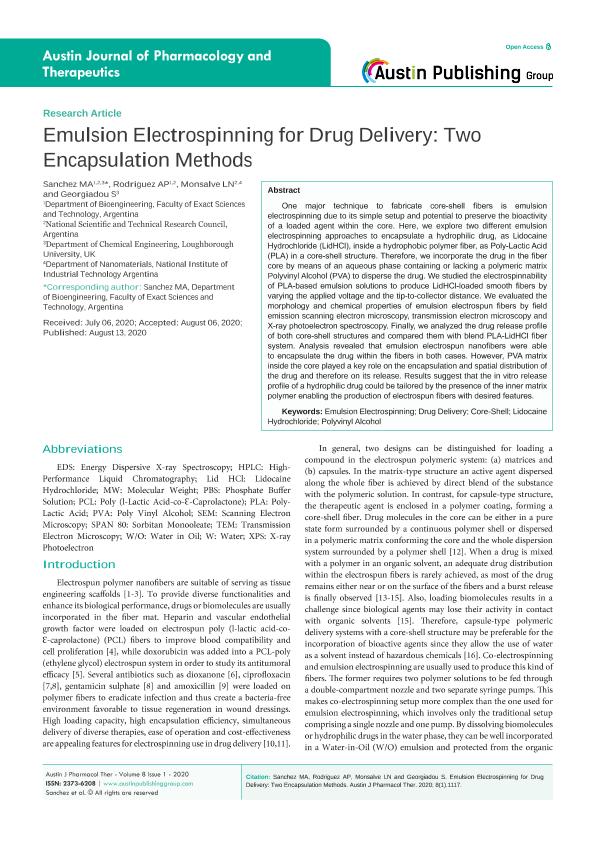Mostrar el registro sencillo del ítem
dc.contributor.author
Sanchez, Maria Alejandra

dc.contributor.author
Rodriguez, Andrea Paola

dc.contributor.author
Monsalve, Leandro Nicolas

dc.contributor.author
Georgiadou S
dc.date.available
2023-01-13T14:04:31Z
dc.date.issued
2020-08
dc.identifier.citation
Sanchez, Maria Alejandra; Rodriguez, Andrea Paola; Monsalve, Leandro Nicolas; Georgiadou S; Emulsion Electrospinning for Drug Delivery: Two Encapsulation Methods; Austin Publishing Group; Austin Journal of Pharmacology and Therapeutics; 8; 1; 8-2020; 1-8
dc.identifier.issn
2373-6208
dc.identifier.uri
http://hdl.handle.net/11336/184670
dc.description.abstract
One major technique to fabricate core-shell fibers is emulsion electrospinning due to its simple setup and potential to preserve the bioactivity of a loaded agent within the core. Here, we explore two different emulsion electrospinning approaches to encapsulate a hydrophilic drug, as Lidocaine Hydrochloride (LidHCl), inside a hydrophobic polymer fiber, as Poly-Lactic Acid (PLA) in a core-shell structure. Therefore, we incorporate the drug in the fiber core by means of an aqueous phase containing or lacking a polymeric matrix Polyvinyl Alcohol (PVA) to disperse the drug. We studied the electrospinnability of PLA-based emulsion solutions to produce LidHCl-loaded smooth fibers by varying the applied voltage and the tip-to-collector distance. We evaluated the morphology and chemical properties of emulsion electrospun fibers by field emission scanning electron microscopy, transmission electron microscopy and X-ray photoelectron spectroscopy. Finally, we analyzed the drug release profile of both core-shell structures and compared them with blend PLA-LidHCl fiber system. Analysis revealed that emulsion electrospun nanofibers were able to encapsulate the drug within the fibers in both cases. However, PVA matrix inside the core played a key role on the encapsulation and spatial distribution of the drug and therefore on its release. Results suggest that the in vitro release profile of a hydrophilic drug could be tailored by the presence of the inner matrix polymer enabling the production of electrospun fibers with desired features.
dc.format
application/pdf
dc.language.iso
eng
dc.publisher
Austin Publishing Group
dc.rights
info:eu-repo/semantics/openAccess
dc.rights.uri
https://creativecommons.org/licenses/by-nc-sa/2.5/ar/
dc.subject
Emulsion Electrospinning
dc.subject
Drug Delivery
dc.subject
Core-Shell
dc.subject
Lidocaine Hydrochloride
dc.subject.classification
Textiles

dc.subject.classification
Ingeniería de los Materiales

dc.subject.classification
INGENIERÍAS Y TECNOLOGÍAS

dc.title
Emulsion Electrospinning for Drug Delivery: Two Encapsulation Methods
dc.type
info:eu-repo/semantics/article
dc.type
info:ar-repo/semantics/artículo
dc.type
info:eu-repo/semantics/publishedVersion
dc.date.updated
2021-09-15T15:10:34Z
dc.journal.volume
8
dc.journal.number
1
dc.journal.pagination
1-8
dc.journal.pais
Estados Unidos

dc.journal.ciudad
Irving
dc.description.fil
Fil: Sanchez, Maria Alejandra. Universidad Nacional de Tucumán. Facultad de Ciencias Exactas y Tecnología. Departamento de Bioingeniería. Laboratorio de Medios e Interfases; Argentina. University of Loughborough; Reino Unido. Consejo Nacional de Investigaciones Científicas y Técnicas. Centro Científico Tecnológico Conicet - Tucumán. Instituto Superior de Investigaciones Biológicas. Universidad Nacional de Tucumán. Instituto Superior de Investigaciones Biológicas; Argentina
dc.description.fil
Fil: Rodriguez, Andrea Paola. Universidad Nacional de Tucumán. Facultad de Ciencias Exactas y Tecnología. Departamento de Bioingeniería. Laboratorio de Medios e Interfases; Argentina. Consejo Nacional de Investigaciones Científicas y Técnicas. Centro Científico Tecnológico Conicet - Tucumán. Instituto Superior de Investigaciones Biológicas. Universidad Nacional de Tucumán. Instituto Superior de Investigaciones Biológicas; Argentina
dc.description.fil
Fil: Monsalve, Leandro Nicolas. Consejo Nacional de Investigaciones Científicas y Técnicas; Argentina. Instituto Nacional de Tecnología Industrial; Argentina
dc.description.fil
Fil: Georgiadou S. University of Loughborough; Reino Unido
dc.journal.title
Austin Journal of Pharmacology and Therapeutics
dc.relation.alternativeid
info:eu-repo/semantics/altIdentifier/url/https://austinpublishinggroup.com/pharmacology-therapeutics/fulltext/ajpt-v8-id1117.pdf
Archivos asociados
